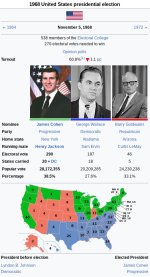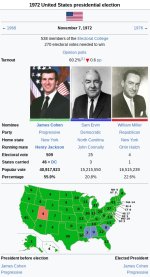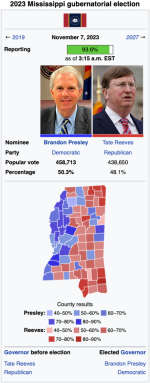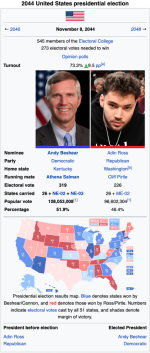-
Hi Guest!
The costs of running this forum are covered by Sea Lion Press. If you'd like to help support the company and the forum, visit patreon.com/sealionpress
You are using an out of date browser. It may not display this or other websites correctly.
You should upgrade or use an alternative browser.
You should upgrade or use an alternative browser.
Alternate Wikibox Thread
- Thread starter gentleman biaggi
- Start date
- Pronouns
- He/Him
...or they could just ask a different general.
Good Job, you just made Walter Walker and David Stirling cry.The concept required a plot against Wilson with Mountbatten at the helm. Thems the brakes
Comrade Izaac
Secretary General of the Alt-Historians Union
- Pronouns
- They/Them
i might be exposing myself here as one of this forum's resident zoomers, but please tell me u originally heard the legend of Gage from Stranger Things and not an actual history or medical lessonAny of y'all remember Phineas Gage, the guy who had a metal spike go through his head and lived, only to have his personality alter dramatically?
- Pronouns
- it/its (you'll get used to the third person thing)
I have done nothing with Caleb Maupin? Think you’re mixing me up with someone else. Also, Tu Quoque.Cat i love u my friend, but u specifically don't get to call anyone else's work "edgy" or TNOheaded. i distinctly remember one of the first lists i ever read by u was one where u unironically made Caleb fucking Maupin and Sameera Kahn General Secretary of the USSA
Comrade Izaac
Secretary General of the Alt-Historians Union
- Pronouns
- They/Them
that's my fault boss mixed u up with @CatalunyaI have done nothing with Caleb Maupin?
Can’t believe you called one of my favorite and most philosophical lists “edgy”.that's my fault boss mixed u up with @Catalunya
I must now put you on mute, and refer to all your scenarios as ‘ASB’.
Comrade Izaac
Secretary General of the Alt-Historians Union
- Pronouns
- They/Them
cat the problem is that i like edgy and incorporate themes that u enjoy putting in ur lists into my own frequently. if my lists are ASB so are urs !Can’t believe you called one of my favorite and most philosophical lists “edgy”.
I must now put you on mute, and refer to all your scenarios as ‘ASB’.
theflyingmgoose
Well-known member
allthepresidentsmen
Oh fuck I might just be gay 🏳️🌈
- Pronouns
- he/him
Let's Go(,) Brandon!
The 2023 Mississippi gubernatorial election took place on November 7, 2023, to choose the next Governor of Mississippi. Primary elections occurred on August 3, 2023, while runoff elections were held on August 25, 2023. The Democratic Party nominated Public Services Commissioner Brandon Presley against minor opposition, while the Republican Party renominated incumbent governor Tate Reeves after a contested runoff against former representative Steven Palazzo.
The campaign focused primarily on the ongoing Jackson water crisis. Presley lambasted Reeve's response to the crisis as incompetent, pointing to skyrocketing water rates and water rationing measures. Reeves would commit a major gaffe when he blamed "those Jackson urban people" for causing the crisis, a remark many Democrats castigated as racist. Reeves would rectify his comment as being directed towards federal government officials advising the city, but his general attitude towards the crisis was viewed as uncaring, which was extremely unpopular with voters.
The results were a major upset from historical expectations, with Presley winning by 33,127 votes (or about 3.4% out of over 974 thousand votes cast) and becoming the first Democrat to sit in the Governor's Mansion in 24 years. Among other factors, the results of the election were commonly attributed to extremely high turnout in Jackson and the Democratic nominee's "populist progressive" agenda, which resonated with voters in the Mississippi Delta and low-turnout voters in general, as well as incumbent governor Reeves' poor reputation in the state, stemming from a reputation of corruption and fund misuse in addition to the dominating water crisis.
This election is considered by political historians to be the beginning of the Democratic Party's "Second Southern Strategy", as well as the beginning of a period of Democratic dominance in Mississippi.
The 2023 Mississippi gubernatorial election took place on November 7, 2023, to choose the next Governor of Mississippi. Primary elections occurred on August 3, 2023, while runoff elections were held on August 25, 2023. The Democratic Party nominated Public Services Commissioner Brandon Presley against minor opposition, while the Republican Party renominated incumbent governor Tate Reeves after a contested runoff against former representative Steven Palazzo.
The campaign focused primarily on the ongoing Jackson water crisis. Presley lambasted Reeve's response to the crisis as incompetent, pointing to skyrocketing water rates and water rationing measures. Reeves would commit a major gaffe when he blamed "those Jackson urban people" for causing the crisis, a remark many Democrats castigated as racist. Reeves would rectify his comment as being directed towards federal government officials advising the city, but his general attitude towards the crisis was viewed as uncaring, which was extremely unpopular with voters.
The results were a major upset from historical expectations, with Presley winning by 33,127 votes (or about 3.4% out of over 974 thousand votes cast) and becoming the first Democrat to sit in the Governor's Mansion in 24 years. Among other factors, the results of the election were commonly attributed to extremely high turnout in Jackson and the Democratic nominee's "populist progressive" agenda, which resonated with voters in the Mississippi Delta and low-turnout voters in general, as well as incumbent governor Reeves' poor reputation in the state, stemming from a reputation of corruption and fund misuse in addition to the dominating water crisis.
This election is considered by political historians to be the beginning of the Democratic Party's "Second Southern Strategy", as well as the beginning of a period of Democratic dominance in Mississippi.
Last edited:
Steve Brinson
The possum is not OK. Neither are we.
- Location
- Brooklyn (originally Houston)
- Pronouns
- he/him
Let's Go(,) Brandon!
The 2023 Mississippi gubernatorial election took place on November 7, 2023, to choose the next Governor of Mississippi. Primary elections occurred on August 3, 2023, while runoff elections were held on August 25, 2023. The Democratic Party nominated Public Services Commissioner Brandon Presley against minor opposition, while the Republican Party renominated incumbent governor Tate Reeves after a contested runoff against former representative Steven Palazzo.
The campaign focused primarily on the ongoing Jackson water crisis. Presley lambasted Reeve's response to the crisis as incompetent, pointing to skyrocketing water rates and water rationing measures. Reeves would commit a major gaffe when he blamed "those Jackson urban people" for causing the crisis, a remark many Democrats castigated as racist. Reeves would rectify his comment as being directed towards federal government officials advising the city, but his general attitude towards the crisis was viewed as uncaring, which was extremely unpopular with voters.
The results were a major upset from historical expectations, with Presley winning by 33,127 votes (or about 3.4% out of over 974 thousand votes cast) and becoming the first Democrat to sit in the Governor's Mansion in 24 years. Among other factors, the results of the election were commonly attributed to extremely high turnout in Jackson and the Democratic nominee's "populist progressive" agenda, which resonated with voters in the Mississippi Delta and low-turnout voters in general, as well as incumbent governor Reeves' poor reputation in the state, stemming from a reputation of corruption and fund misuse in addition to the dominating water crisis.
This election is considered by political historians to be the beginning of the Democratic Party's "Second Southern Strategy", as well as the beginning of a period of Democratic dominance in Mississippi.
I just realized I never actually knew what Brandon Presley looked like.
Great post, let's hope it becomes reality.
XO🌈
An actual* satyr
- Location
- The agora of ideas
- Pronouns
- Whatever you want, darling
- Location
- Toronto, ON, CA
Back to the Future: Across the Multiverse is sickening, bravo.
Honestly I always wanted to see a Back to the Future remake from 2015 where 2015 is now treated as 1985, 1985 is treated like 1955 and so on. Yes it's obvious but it still could've been fun if it wasn't too much of a cynical cash-in.
allthepresidentsmen
Oh fuck I might just be gay 🏳️🌈
- Pronouns
- he/him
Analogy time
Presidents of the United States of America:
2029-2033: Joe Lombardo (Republican)
Presidents of the United States of America:
2029-2033: Joe Lombardo (Republican)
'28 (w. Tim Scott) def. Katie Hobbs / Ritchie Torres (Democratic), Madison Cawthorn / Matt Shea (Patriot)
2033-2041: Michelle Wu (Democratic)'32 (w. Andy Beshear) def. Joe Lombardo / Tim Scott (Republican)
'36 (w. Andy Beshear) def. Andrew Garbarino / Vance Aloupis (Republican)
2041-2045: Adin Ross (Republican)'40 (w. Cliff Pirtle) def. Chasten Buttigieg / Marina Dimitrijevic (Democratic)
2045-0000: Andy Beshear (Democratic)'44 (w. Athena Salman) def. Adin Ross / Cliff Pirtle (Republican)
Walpurgisnacht
It was in the Year of Maximum Danger
- Location
- Banned from the forum
- Pronouns
- He/Him
Honestly I always wanted to see a Back to the Future remake from 2015 where 2015 is now treated as 1985, 1985 is treated like 1955 and so on. Yes it's obvious but it still could've been fun if it wasn't too much of a cynical cash-in.
Now I'm wondering how you'd do Hell Valley Biff Tannen in this version of the movies--the classic billionare stereotypes have largely shifted from jock to nerd, and assuming you're on a similar timescale to the last set of movies you can't go back to the original inspiration because he's trying to delegitimatise the election.
Ebolaman123
Active member
L timelineAnalogy time
Presidents of the United States of America:
2029-2033: Joe Lombardo (Republican)
'28 (w. Tim Scott) def. Katie Hobbs / Ritchie Torres (Democratic), Madison Cawthorn / Matt Shea (Patriot)2033-2041: Michelle Wu (Democratic)
'32 (w. Andy Beshear) def. Joe Lombardo / Tim Scott (Republican)'36 (w. Andy Beshear) def. Andrew Garbarino / Vance Aloupis (Republican)2041-2045: Adin Ross (Republican)
'40 (w. Cliff Pirtle) def. Chasten Buttigieg / Marina Dimitrijevic (Democratic)2045-0000: Andy Beshear (Democratic)
'44 (w. Athena Salman) def. Adin Ross / Cliff Pirtle (Republican)
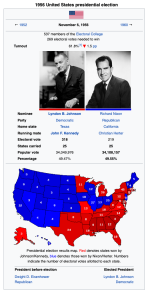
POD: United States President Dwight D. Eisenhower declined to run for re-election after his 1955 heart attack. The election was between Vice President Richard Nixon and MA Governor Christian Herter vs Senate Majority Leader Lyndon B. Johnson and Senator John F. Kennedy. This was the first election in which the states of Alaska and Hawai'i participated and the last to use the electoral college. After narrowly winning the presidency, "Landslide Lyndon" would abolish the electoral college in favor of the popular vote president in the Twenty-third Amendment to the United States Constitution, which gave all US citizens over 18 the right to vote and prohibited attempts to suppress, deny, or abridge the right to vote on the basis of race or national origin. Subsections included specifically outlawing the poll tax and other Jim Crow voter suppression laws such as literacy tests ("how many bubbles are in a bar of soap?")
Nixon easily defeated Senator Joe McCarthy in the Republican primaries while the Democratic primaries went all the way to the Democratic National Convention in Chicago. Former President Harry Truman backed New York Governor Averell Harriman, Chicago Mayor Richard Daley preferred Illinois Governor Adlai Stevenson, and Senator Estes Kefauver of Tennessee was widely disliked by party bosses but had done reasonably well in the primaries. When Stevenson's delegate lead began to peel away, he surprised everyone by announcing he would accept a vote by the convention's delegates to choose his running mate if nominated by the Democratic Party. This set off a desperate scramble among several potential vice-presidents. Stevenson preferred Senator John F. Kennedy to be his running mate, but kept his preferences private. Kennedy surprised the experts by surging into the lead on the second ballot after a crucial endorsement from Senate Majority Leader Lyndon Johnson; at this point, the Master of the Senate was able to talk the party bosses into accepting a Johnson/Kennedy ticket as the best compromise between all factions of the party.
On the day of the Suez Crisis, the United States and United Kingdom planned a coup to overthrow the President of Syria. In this timeline, this goes ahead as planned but it's a bungled mess. While the world is confused over who governs Syria, Israel invades Jordan and Lebanon as Ben-Gurion originally wanted to do anyways. Eisenhower was furious, as this overshadowed the Soviet invasion of Hungary which had already ruined his plans for a superpower summit in his last year in office.
From the perspective of Nasser, the dominant power in the Middle East at the time was Britain, and its main ally Hashemite Iraq was divided on how to proceed. Pro-British Nuri al-Said and Prince Abdullah send the army to "protect" Syria but King Faisal II wants to fully enter the war against the Israel-UK-France Alliance to help his cousin King Hussein of Jordan, who had joined Nasser in a defensive alliance after Ben-Gurion's invasion. Brief civil unrest in Syria and Iraq lead to Nasser being declared provisional president of both countries. Eisenhower was furious but the Tripartite Aggressor of Israel, Britain, and France hoped to outlast the lame-duck president given candidates Nixon and Johnson's open support for Israel in the face of prevailing US public opinion. Eisenhower publicly scolded both presidential candidates and warned of the "congressional-industrial-military complex." After Eisenhower threatened a run on the pound and franc, Britain and France back down. At war's end, the United Arab Republic (UAR) is declared in Damascus and this new federal state is allied to the Kingdom of Saudi Arabia, overjoyed at the downfall of the Hashemites. "If we go down in the region, we might as well go down backing Arab nationalism," Eisenhower concluded. A hastily-arranged superpower summit provides mutual recognition by Israel and the Arab states in exchange for the Palestinian right of return and a guarantee by Nasser and King Saud to sell oil prices at a low rate in US dollars.
Within the United Arab Republic, former King Hussein of Jordan becomes a loyal underling of Nasser while his cousin Faisal II goes into exile, eventually becoming a Congressman from Miami. British Prime Minister Anthony Eden is soon replaced by Harold MacMillian who in turn loses to Hugh Gaitskell in 1959. In Israel, Prime Minister Ben-Gurion falls from power in favor of the more dovish PM Moshe Sharrett. The French Fourth Republic did not long survive the crisis, as Charles de Gaulle launched a coup to declare the Fifth French Republic after the humiliation of the formation of the United Arab Republic to French national pride.
Last edited:
Vidal
Well-known member
- Location
- Washington, DC
- Pronouns
- he/him
1984 United States presidential election
 The 1984 United States presidential election was the 50th quadrennial presidential election. It was held on Tuesday, November 6, 1984. Democratic former vice president Walter Mondale defeated Republican incumbent President Richard Lugar, winning 327 electoral votes and 53.1% of the national popular vote. It marked the second election in a row in which an incumbent president failed to win reelection.
The 1984 United States presidential election was the 50th quadrennial presidential election. It was held on Tuesday, November 6, 1984. Democratic former vice president Walter Mondale defeated Republican incumbent President Richard Lugar, winning 327 electoral votes and 53.1% of the national popular vote. It marked the second election in a row in which an incumbent president failed to win reelection.
Lugar, chosen in 1980 as the running mate for Ronald Reagan, ascended to the presidency upon Reagan's assassination in 1981. His presidency soon ran into trouble. His decision to elevate Secretary of State George H.W. Bush to the vice presidency was controversial with his Party's right-wing, and his handling of the 1981 PATCO Strike was largely criticized, especially after the Pan-Am Flight 182 disaster.
The election took place at the end of the Early 1980s recession, leading Lugar to reflect in his 1988 memoir that he had voting occurred "two months later" he would have been reelected as president.
Mondale comfortably won the 1984 Democratic primaries, fending off candidacies from Senators Gary Hart and John Glenn and Reverend Jesse Jackson. His running mate, Geraldine Ferraro, made history as the first woman chosen to serve on a major party's presidential ticket. She became the first woman Vice President of the United States in history. Though her nomination posed some challenges for the Mondale ticket, historians largely credit her candidacy with helping Mondale prevail in the gender gap, which proved decisive in securing Mondale's victory.
Mondale sought to position himself as a return to good government and international stability. In addition to criticizing Lugar on the PATCO Strike, he also emphasized the 1983 United States embassy bombing in Beirut and Lugar's mishandling of Able Archer 83 and his performance at the subsequent 1983 Vienna Conference with Soviet Leader Yuri Andropov as examples of Lugar being incapable of handling his responsibilities as president. These insinuations were supported in pop culture, including Joe Piscopo's portrayal of Lugar as aloof and prone to misspeaking on Saturday Night Live. In one memorable sketch, Piscopo portrayed Lugar dressed as Oliver Twist. He consumed both of his feet and then went to Vice President George H.W. Bush, asking, "Please, sir, can I have some more?"
The candidates participated in three nationally-televised debates. Mondale was routinely seen as the stronger debater, helping him to secure his victory.

Lugar, chosen in 1980 as the running mate for Ronald Reagan, ascended to the presidency upon Reagan's assassination in 1981. His presidency soon ran into trouble. His decision to elevate Secretary of State George H.W. Bush to the vice presidency was controversial with his Party's right-wing, and his handling of the 1981 PATCO Strike was largely criticized, especially after the Pan-Am Flight 182 disaster.
The election took place at the end of the Early 1980s recession, leading Lugar to reflect in his 1988 memoir that he had voting occurred "two months later" he would have been reelected as president.
Mondale comfortably won the 1984 Democratic primaries, fending off candidacies from Senators Gary Hart and John Glenn and Reverend Jesse Jackson. His running mate, Geraldine Ferraro, made history as the first woman chosen to serve on a major party's presidential ticket. She became the first woman Vice President of the United States in history. Though her nomination posed some challenges for the Mondale ticket, historians largely credit her candidacy with helping Mondale prevail in the gender gap, which proved decisive in securing Mondale's victory.
Mondale sought to position himself as a return to good government and international stability. In addition to criticizing Lugar on the PATCO Strike, he also emphasized the 1983 United States embassy bombing in Beirut and Lugar's mishandling of Able Archer 83 and his performance at the subsequent 1983 Vienna Conference with Soviet Leader Yuri Andropov as examples of Lugar being incapable of handling his responsibilities as president. These insinuations were supported in pop culture, including Joe Piscopo's portrayal of Lugar as aloof and prone to misspeaking on Saturday Night Live. In one memorable sketch, Piscopo portrayed Lugar dressed as Oliver Twist. He consumed both of his feet and then went to Vice President George H.W. Bush, asking, "Please, sir, can I have some more?"
The candidates participated in three nationally-televised debates. Mondale was routinely seen as the stronger debater, helping him to secure his victory.
allthepresidentsmen
Oh fuck I might just be gay 🏳️🌈
- Pronouns
- he/him
2032 United States presidential election
From Wikipedia, the free encyclopedia
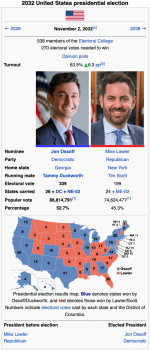 The 2032 United States presidential election was the 62nd quadrennial presidential election, held on Tuesday, November 2, 2032. The Democratic ticket of Georgia Senator Jon Ossoff and Illinois Senator Tammy Duckworth defeated the Republican ticket of incumbent President Mike Lawler and Vice President Tim Scott by a decisive margin. Ossoff became the first Jewish-American to be elected president, while Duckworth became the first Iraq veteran to be elected vice president. This was the last election where all four major party candidates for president and vice president would become their party's presidential nominee until 2056, making it the first such election since 1976. It was the first-ever U.S. presidential election where the presidential nominees of both major parties were millennials. The election saw the highest voter turnout by percentage since 2020, with each of the two main tickets receiving more than 74 million votes. Ossoff received more than 86 million votes, at the time the most votes ever cast for a candidate in a presidential election.
The 2032 United States presidential election was the 62nd quadrennial presidential election, held on Tuesday, November 2, 2032. The Democratic ticket of Georgia Senator Jon Ossoff and Illinois Senator Tammy Duckworth defeated the Republican ticket of incumbent President Mike Lawler and Vice President Tim Scott by a decisive margin. Ossoff became the first Jewish-American to be elected president, while Duckworth became the first Iraq veteran to be elected vice president. This was the last election where all four major party candidates for president and vice president would become their party's presidential nominee until 2056, making it the first such election since 1976. It was the first-ever U.S. presidential election where the presidential nominees of both major parties were millennials. The election saw the highest voter turnout by percentage since 2020, with each of the two main tickets receiving more than 74 million votes. Ossoff received more than 86 million votes, at the time the most votes ever cast for a candidate in a presidential election.
Incumbent Republican Mike Lawler sought re-election to a second term in office amidst a struggling global economy and slumping approval ratings. Despite murmurs of a serious primary challenge against his renomination, Lawler would ultimately be renominated by a wide margin against commentator and former Defense Department official Kash Patel. In the Democratic primaries, 2028 runner-up Jon Ossoff would once again mount a campaign for president, ultimately fending off a fractured field of primary challengers, including California Governor London Breed and Maryland Senator Pete Buttigieg.
The 2032 election was largely dominated by the Seattle General Strike and a concurrent attempt by a group of international conglomerates — including Amazon, Tencent, and Binance — to "buy" the Seattle city government due to the city government's bankruptcy. Ossoff — having already tacked to the progressive left during his 2028 primary bid — continued his leftward drift, promising to restrict corporate power and strengthen workers' protections, as well as calling for the audit of the finances of major cryptocurrency firms. Lawler — while promising to investigate the takeover effort — would be criticized for his prior history of executive action against labor advocates and unionization protests, which many viewed as overly corporatist, and major Republican politicians would frequently make unpopular attacks against unionization efforts. While foreign policy would never become the defining issue of the campaign as it did in 2028, the aftermath of the Kashmir War, the South African political crisis, and the collapse of the Tatmadaw junta in Myanmar would contribute to Lawler's perception as being unable to handle an unstable geopolitical scene. Other domestic issues subject to debate during the campaign included the rise in civil disorder, historically-high unemployment, and the aftermath of Hurricane Imelda, which left much of southern Florida devastated. Ossoff would attack Lawler as inept and uncaring, and labeled the Republican incumbent as a corporate crony and someone unwilling to take decisive action. Lawler would campaign on the need for continuity (in turn attacking the Democratic hopeful as a reckless far-left zealot), the slow return of blue-collar jobs to the United States, and the need to "keep the economy free" (owing to Ossoff's push for a nigh-unprecedented number of corporate regulations). The issue of nuclear power and housing development also became a key issue, with Democrats adopting a YIMBY stance and Republicans a NIMBY one.
While polling remained competitive throughout the early election season, Ossoff's lead would gradually widen as the corporate attempt to "buy" Seattle was leaked and the Seattle general strike began. In the final week before the election, Ossoff held an aggregate lead of 6 points as mail-in voting and early voting began across the nation. Notably, this was the first election where more than five states (Alaska, Arizona, Colorado, Georgia, Maine, Michigan, and Washington) adopted instant-runoff voting for presidential contests. Ossoff would build up a large lead by winning the key swing states of Georgia, Michigan, and Pennsylvania, all of which had been critical to Biden's victory in the previous two elections, as well as flipping the state of Arizona before 11pm. Ossoff would become the first presidential nominee since Donald Trump in 2016 to cross the 270-electoral-vote threshold for victory on Election Day when he was declared the victor in the state of Wisconsin at 11:23 pm. He went on to receive 339 electoral votes, flipping the states of Alaska, Arizona, Georgia, Mississippi, Nevada, Pennsylvania, and Texas. The Democratic Party would also expand its congressional majorities.
Ossoff became the first Democrat to win Mississippi and Texas since 1976, and Alaska since Lyndon B. Johnson's landslide re-election in 1964. Meanwhile, despite going down in defeat, Lawler would win New Hampshire and New Jersey's statewide contests. This was the last time Nebraska would use its district-based electoral system, as it would be abolished in 2035. It is considered by many to be the start of the Seventh Party System and was the last election held before the statehood of Washington, D.C. and Puerto Rico.
In case you didn't know, this is my sequel to @Excelsior's scenario.
From Wikipedia, the free encyclopedia
 The 2032 United States presidential election was the 62nd quadrennial presidential election, held on Tuesday, November 2, 2032. The Democratic ticket of Georgia Senator Jon Ossoff and Illinois Senator Tammy Duckworth defeated the Republican ticket of incumbent President Mike Lawler and Vice President Tim Scott by a decisive margin. Ossoff became the first Jewish-American to be elected president, while Duckworth became the first Iraq veteran to be elected vice president. This was the last election where all four major party candidates for president and vice president would become their party's presidential nominee until 2056, making it the first such election since 1976. It was the first-ever U.S. presidential election where the presidential nominees of both major parties were millennials. The election saw the highest voter turnout by percentage since 2020, with each of the two main tickets receiving more than 74 million votes. Ossoff received more than 86 million votes, at the time the most votes ever cast for a candidate in a presidential election.
The 2032 United States presidential election was the 62nd quadrennial presidential election, held on Tuesday, November 2, 2032. The Democratic ticket of Georgia Senator Jon Ossoff and Illinois Senator Tammy Duckworth defeated the Republican ticket of incumbent President Mike Lawler and Vice President Tim Scott by a decisive margin. Ossoff became the first Jewish-American to be elected president, while Duckworth became the first Iraq veteran to be elected vice president. This was the last election where all four major party candidates for president and vice president would become their party's presidential nominee until 2056, making it the first such election since 1976. It was the first-ever U.S. presidential election where the presidential nominees of both major parties were millennials. The election saw the highest voter turnout by percentage since 2020, with each of the two main tickets receiving more than 74 million votes. Ossoff received more than 86 million votes, at the time the most votes ever cast for a candidate in a presidential election.Incumbent Republican Mike Lawler sought re-election to a second term in office amidst a struggling global economy and slumping approval ratings. Despite murmurs of a serious primary challenge against his renomination, Lawler would ultimately be renominated by a wide margin against commentator and former Defense Department official Kash Patel. In the Democratic primaries, 2028 runner-up Jon Ossoff would once again mount a campaign for president, ultimately fending off a fractured field of primary challengers, including California Governor London Breed and Maryland Senator Pete Buttigieg.
The 2032 election was largely dominated by the Seattle General Strike and a concurrent attempt by a group of international conglomerates — including Amazon, Tencent, and Binance — to "buy" the Seattle city government due to the city government's bankruptcy. Ossoff — having already tacked to the progressive left during his 2028 primary bid — continued his leftward drift, promising to restrict corporate power and strengthen workers' protections, as well as calling for the audit of the finances of major cryptocurrency firms. Lawler — while promising to investigate the takeover effort — would be criticized for his prior history of executive action against labor advocates and unionization protests, which many viewed as overly corporatist, and major Republican politicians would frequently make unpopular attacks against unionization efforts. While foreign policy would never become the defining issue of the campaign as it did in 2028, the aftermath of the Kashmir War, the South African political crisis, and the collapse of the Tatmadaw junta in Myanmar would contribute to Lawler's perception as being unable to handle an unstable geopolitical scene. Other domestic issues subject to debate during the campaign included the rise in civil disorder, historically-high unemployment, and the aftermath of Hurricane Imelda, which left much of southern Florida devastated. Ossoff would attack Lawler as inept and uncaring, and labeled the Republican incumbent as a corporate crony and someone unwilling to take decisive action. Lawler would campaign on the need for continuity (in turn attacking the Democratic hopeful as a reckless far-left zealot), the slow return of blue-collar jobs to the United States, and the need to "keep the economy free" (owing to Ossoff's push for a nigh-unprecedented number of corporate regulations). The issue of nuclear power and housing development also became a key issue, with Democrats adopting a YIMBY stance and Republicans a NIMBY one.
While polling remained competitive throughout the early election season, Ossoff's lead would gradually widen as the corporate attempt to "buy" Seattle was leaked and the Seattle general strike began. In the final week before the election, Ossoff held an aggregate lead of 6 points as mail-in voting and early voting began across the nation. Notably, this was the first election where more than five states (Alaska, Arizona, Colorado, Georgia, Maine, Michigan, and Washington) adopted instant-runoff voting for presidential contests. Ossoff would build up a large lead by winning the key swing states of Georgia, Michigan, and Pennsylvania, all of which had been critical to Biden's victory in the previous two elections, as well as flipping the state of Arizona before 11pm. Ossoff would become the first presidential nominee since Donald Trump in 2016 to cross the 270-electoral-vote threshold for victory on Election Day when he was declared the victor in the state of Wisconsin at 11:23 pm. He went on to receive 339 electoral votes, flipping the states of Alaska, Arizona, Georgia, Mississippi, Nevada, Pennsylvania, and Texas. The Democratic Party would also expand its congressional majorities.
Ossoff became the first Democrat to win Mississippi and Texas since 1976, and Alaska since Lyndon B. Johnson's landslide re-election in 1964. Meanwhile, despite going down in defeat, Lawler would win New Hampshire and New Jersey's statewide contests. This was the last time Nebraska would use its district-based electoral system, as it would be abolished in 2035. It is considered by many to be the start of the Seventh Party System and was the last election held before the statehood of Washington, D.C. and Puerto Rico.
In case you didn't know, this is my sequel to @Excelsior's scenario.



